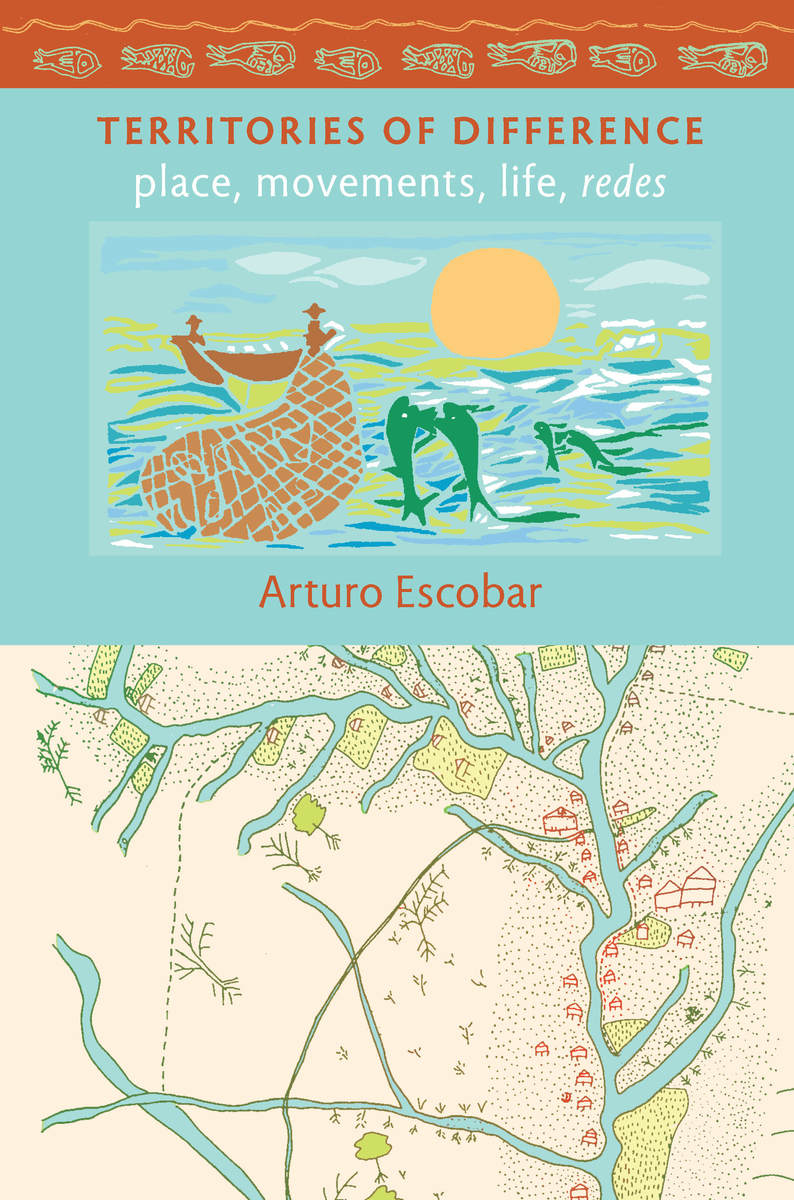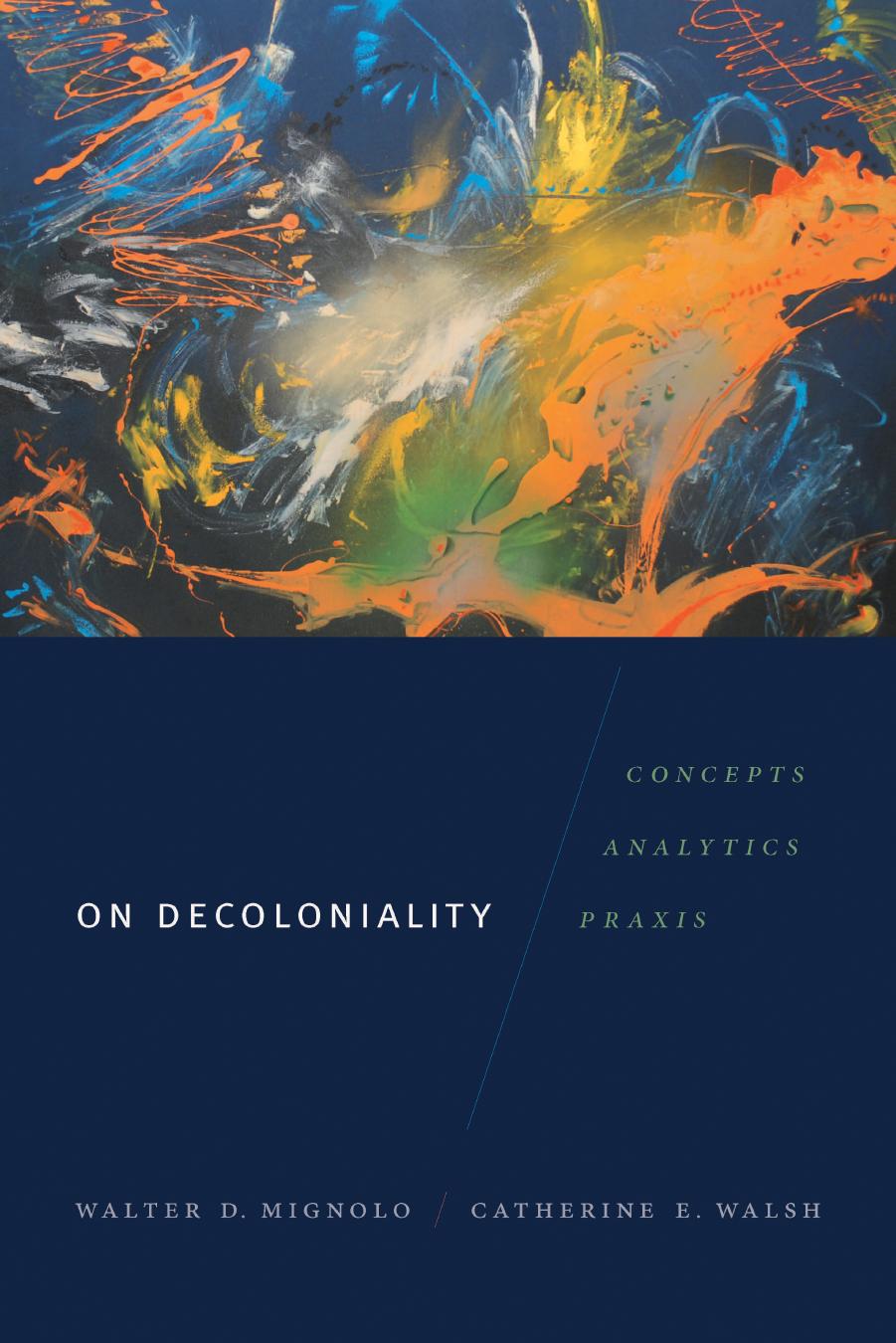Arturo Escobar: Territories of Difference: Place, Movements, Life, Redes (2008)
Filed under book | Tags: · anthropology, assemblage, biodiversity, black people, complexity theory, decoloniality, epistemology, ethnography, governance, indigenous peoples, modernity, nature, politics, self-organization, social movements, state, territory

“In Territories of Difference, Arturo Escobar, author of the widely debated book Encountering Development, analyzes the politics of difference enacted by specific place-based ethnic and environmental movements in the context of neoliberal globalization. His analysis is based on his many years of engagement with a group of Afro-Colombian activists of Colombia’s Pacific rainforest region, the Proceso de Comunidades Negras (PCN). Escobar offers a detailed ethnographic account of PCN’s visions, strategies, and practices, and he chronicles and analyzes the movement’s struggles for autonomy, territory, justice, and cultural recognition. Yet he also does much more. Consistently emphasizing the value of local activist knowledge for both understanding and social action and drawing on multiple strands of critical scholarship, Escobar proposes new ways for scholars and activists to examine and apprehend the momentous, complex processes engulfing regions such as the Colombian Pacific today.
Escobar illuminates many interrelated dynamics, including the Colombian government’s policies of development and pluralism that created conditions for the emergence of black and indigenous social movements and those movements’ efforts to steer the region in particular directions. He examines attempts by capitalists to appropriate the rainforest and extract resources, by developers to set the region on the path of modernist progress, and by biologists and others to defend this incredibly rich biodiversity “hot-spot” from the most predatory activities of capitalists and developers. He also looks at the attempts of academics, activists, and intellectuals to understand all of these complicated processes. Territories of Difference is Escobar’s effort to think with Afro-Colombian intellectual-activists who aim to move beyond the limits of Eurocentric paradigms as they confront the ravages of neoliberal globalization and seek to defend their place-based cultures and territories.”
Publisher Duke University Press, 2008
New Ecologies for the Twenty-first Century series, 1
ISBN 9780822343271, 0822343274
xvi+435 pages
Reviews: Laura Fano Morrissey (Development, 2009), Christopher L. Chiappari (Latin American Politics & Society, 2010), Pierre Hamel (American Journal of Sociology, 2010), Lilly U. Nguyen (Interactions, 2010), Rodrigo A. Lima de Medeiros & Guilherme F. W. Radomsky (Sociedade e Estado, 2010, BR-PT), Manuel J. Prieto (Revista de geografía Norte Grande, 2010, ES), Jeffrey S. Juris (American Anthropologist, 2011), Cornelia Butler Flora (J Agric Environ Ethics, 2011), Claudia Steiner (Americas, 2011), Paul Routledge, Juanita Sundberg, Marcus Power, & Arturo Escobar (Progress in Human Geography, 2012).
PDF (5 MB)
Comment (0)Ravi Sundaram: Pirate Modernity: Delhi’s Media Urbanism (2009)
Filed under book | Tags: · city, delhi, globalisation, infrastructure, mass media, modernism, modernity, piracy, postcolonialism, urban planning, urban studies, urbanism

“Using Delhi’s contemporary history as a site for reflection, Pirate Modernity moves from a detailed discussion of the technocratic design of the city by US planners in the 1950s, to the massive expansions after 1977, culminating in the urban crisis of the 1990s.
As a practice, pirate modernity is an illicit form of urban globalization. Poorer urban populations increasingly inhabit non-legal spheres: unauthorized neighborhoods, squatter camps and bypass legal technological infrastructures (media, electricity). This pirate culture produces a significant enabling resource for subaltern populations unable to enter the legal city. Equally, this is an unstable world, bringing subaltern populations into the harsh glare of permanent technological visibility, and attacks by urban elites, courts and visceral media industries. The book examines contemporary Delhi from some of these sites: the unmaking of the citys modernist planning design, new technological urban networks that bypass states and corporations, and the tragic experience of the road accident terrifyingly enhanced by technological culture. Pirate Modernity moves between past and present, along with debates in Asia, Africa and Latin America on urbanism, media culture, and everyday life.
This pioneering book suggests cities have to be revisited afresh after proliferating media culture. Pirate Modernity boldly draws from urban and cultural theory to open a new agenda for a world after media urbanism.”
Publisher Routledge, Oxford & New York, 2009
Asia’s Transformations series
ISBN 9780415409667, 0415409667
xix+224 pages
HT Geraldine
Reviews: Diya Mehra (SAMAJ, 2011), Fei An Tjan (Masters of Media, 2010).
PDF (10 MB)
Comment (0)Walter D. Mignolo, Catherine E. Walsh: On Decoloniality: Concepts, Analytics, Praxis (2018)
Filed under book | Tags: · africa, capitalism, colonialism, cosmology, decoloniality, decolonization, eurocentrism, gender, indigenous peoples, knowledge, modernity, neoliberalism, pedagogy, race, racism, theory, university, zapatistas

“In On Decoloniality Walter D. Mignolo and Catherine E. Walsh explore the hidden forces of the colonial matrix of power, its origination, transformation, and current presence, while asking the crucial questions of decoloniality’s how, what, why, with whom, and what for. Interweaving theory-praxis with local histories and perspectives of struggle, they illustrate the conceptual and analytic dynamism of decolonial ways of living and thinking, as well as the creative force of resistance and re-existence. This book speaks to the urgency of these times, encourages delinkings from the colonial matrix of power and its ‘universals’ of Western modernity and global capitalism, and engages with arguments and struggles for dignity and life against death, destruction, and civilizational despair.”
Publisher Duke University Press, Durham, 2018
On Decoloniality series, 1
ISBN 9780822370949, 0822370948
xiii+291 pages
Reviews: Sara Castro-Klarén (MLN, 2019), Sneja Gunew (Postcolonial Text, 2019), Kirsten Mundt (Cultural Studies, 2019), Laura Maria de Vos (Transmotion, 2018), Joe Parker (Society+Space, 2020).
PDF (4 MB, updated on 2020-1-26)
Comment (0)
